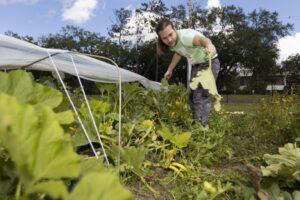May 15, 2023UF students learn growing skills in horticultural sciences teaching garden
Luminous yellow squash, bright red turnips and blooming artichokes are only some of the crops that were grown this spring in University of Florida’s Horticultural Sciences Teaching Garden.
The garden is an experiential learning garden for students. The flourishing fields sit south of Fifield Hall on Hull Road and reflect endless hours of science, dedication and care, according to a news release.


In the field, students put knowledge into practice. Under the guidance of their professors, groups of students in the organic and sustainable crop production class design organic field systems to create their dream farm and later take home fresh, harvested produce to share with friends and family.
“The students really consider it their own farm. They design, monitor and manage the plot themselves and respond to emerging problems by coming up with integrated and creative solutions,” Xin Zhao, a professor in UF/IFAS horticultural sciences department said in the release. Zhao hosts her lab in the field as part of her organic and sustainable crop production class.
What’s unique about the student gardens is its proximity to UF/IFAS experts and facilities that allow students to dive deeper into the real-world practices of running a small farm.
“Just the other day, we pulled a young, wilted watermelon seedling from our field and walked it over to the UF/IFAS Plant Diagnostic Center where we were able to identify the infection,” Zack Black, the student garden’s farm manager, said in the release. “Within walking distance, students are able to seek answers to just about any plant-related problem and gain first-hand learning experiences.”
For example, students get hands-on experience with intercropping, or the practice of growing two or more crops in proximity to produce a greater yield. The practice also serves as a pest management tool and allows for less wasting of resources that otherwise wouldn’t be used by a single crop.


In the field, students also learn to create living ecosystems that mimic nature. Emma Turner, a student in Zhao’s class, recalled being surprised by random tomato plants growing in her group’s plot.
“I realized a lot of ‘volunteer’ plants, ones that grow on their own without intentional planting, were growing because of the remaining seeds from last fall’s plantings,” she said in the release.
However, Emma’s classmate, Ruby Noland, recognized that the garden’s decade-long usage of organic farming methods meant its soil had a lot of biodiversity and nutrition. The soil’s organic matter content has been boosted through years of intercropping and the use of compost, in addition to the planting of cover crops between seasons to maintain soil health.
“Right now, our soil has higher levels of organic matter content than conventional Florida soil,” she said in the release. “The increased soil organic matter content helps overcome some major challenges associated with Florida’s sandy soils usually having less than 1% of organic matter content.”
While the gardens provide a safe space for students to experiment and put their knowledge to the test, the real charm is learning the story behind every fresh fruit and vegetable.
“My favorite part is just seeing where food comes from,” Noland said in the release. “I can see everything come to fruition.”















